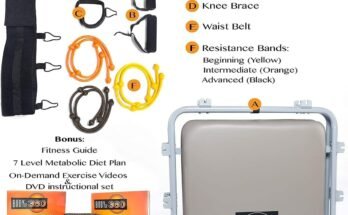Weight loss can cause back pain in a few ways. First, as you lose weight, your center of gravity changes and puts more strain on your lower back. Second, losing muscle mass in your back can make the joints and bones in your spine more vulnerable to injury.
Finally, excess fat around the abdomen can put pressure on the nerves and muscles in the lower back, leading to pain. If you are overweight and experiencing back pain, talk to your doctor about a safe weight loss plan.
“Losing weight can be a great way to improve your overall health, but it can also lead to some unexpected side effects. One of these is back pain. While the extra weight may put strain on your back, the real cause of the pain is often loss of muscle mass.”
When you lose weight, you also lose muscle tissue. This can leave your back vulnerable to injury and pain. There are a few things you can do to prevent or ease back pain when losing weight:
-Strengthen your core muscles with exercises like crunches and planks. A strong core will help support your back and spine.
-Be careful when lifting weights. Use proper form and technique to avoid putting unnecessary strain on your back.
-Wear supportive shoes. Wearing shoes with good arch support will help reduce stress on your lower back.
How Body Weight Affects Your Back Pain | Video
What are the Symptoms of Losing Weight Too Fast?
Losing weight too quickly can have a number of negative side effects on your health. Some of the more common symptoms include: 1. Fatigue: Feeling tired and sluggish is one of the most common complaints when people lose weight too fast.
This is because your body isn’t getting the nutrients it needs to function properly. When you cut calories drastically, your body starts to burn muscle for energy instead of fat. This can lead to fatigue and a general feeling of weakness.
2. Headaches: Another common symptom of losing weight too quickly is headaches. This is usually due to dehydration, as your body isn’t getting enough water to function properly. Headaches can also be caused by low blood sugar levels, as your body isn’t getting the energy it needs from food.
3. dizziness: Losing weight too rapidly can cause lightheadedness and dizziness due to low blood pressure and decreased blood sugar levels. This can make it difficult to concentrate or even stand up without feeling faint. 4. Irritability: Cutting calories dramatically can also lead to feelings of irritability and anxiety.
Can Not Eating Enough Cause Back Pain?
If you’re not eating enough, it can lead to weight loss and malnutrition. This can put stress on your spine and other joints, and cause back pain. Not getting enough nutrients can also weaken your bones, making them more susceptible to fractures.
If you think you may be not eating enough, talk to your doctor or a registered dietitian.
Can Rapid Weight Loss Cause Muscle Aches?
When you lose weight quickly, your body doesn’t have time to adjust and this can lead to muscle aches. When you suddenly reduce the amount of calories you consume, your body will start to break down muscle for energy. This can lead to cramps, pain and stiffness.
To avoid this, it’s important to lose weight slowly and steadily. Try reducing your calorie intake by 500 calories per day and exercising for 30 minutes each day. This will help you lose weight safely and prevent muscle aches.
How Can I Lose Weight Without Hurting My Back?
Losing weight can be a difficult and daunting task, especially if you are worried about hurting your back in the process. However, there are a few things you can do to help lose weight without putting too much strain on your back. One of the best ways to lose weight is through exercise.
However, when exercising it is important to choose exercises that will not put too much strain on your back. Cardio exercises such as walking, jogging, or swimming are all great options that will help you burn calories while also being easy on your back. Strength training exercises are also a great option for losing weight, but be sure to use lighter weights and focus on form rather than lifting heavy weights that could potentially injure your back.
In addition to exercise, another way to help lose weight is by eating healthy. Eating lots of fruits and vegetables as well as lean protein and whole grains will help boost your metabolism and promote weight loss. Avoiding processed foods, sugary drinks, and excessive amounts of saturated fat will also help reduce inflammation throughout your body which can lead to pain in the lower back region.
Overall, losing weight requires a healthy diet and regular exercise routine. However, there are certain precautions you can take to avoid hurting your back in the process.
Upper Back Pain When Losing Weight
Losing weight can be a great way to improve your overall health and quality of life. However, it can also lead to upper back pain in some people. This is because as you lose weight, your body composition changes and the distribution of your body fat changes.
This can put more pressure on the bones and muscles in your upper back, which can lead to pain. There are a few things you can do to help reduce or prevent upper back pain when losing weight:
-Maintain good posture when standing, sitting, and moving. This will help take some of the pressure off of your upper back.
-Wear supportive shoes that provide good arch support. This will help reduce strain on your lower back and spine.
-Strengthen the muscles in your core and back with exercises like planks, bridges, and rows.
Stronger muscles will help support your spine and take some of the pressure off of your bones. If you are experiencing upper back pain while losing weight, talk to your doctor or a physical therapist about ways to relieve the pain and prevent it from getting worse.
Weight Loss Back Pain Cancer
If you’re struggling with weight loss and back pain, you may be wondering if there’s a connection. Unfortunately, obesity is a risk factor for many types of cancer, including some of the most common and deadly forms, such as pancreatic, breast, and colorectal cancer. But that’s not the whole story.
Carrying extra weight also puts added strain on your back and spine. This can lead to conditions like herniated disks and degenerative disk disease, which can cause chronic pain. In fact, studies have shown that obese people are more likely to experience low back pain than people of healthy weight.
The good news is that even modest weight loss can have a positive impact on both your back pain and your cancer risk. So if you’re struggling with your weight, talk to your doctor about safe and effective ways to lose pounds – it could save your life.
Hip And Back Pain After Losing Weight
If you’ve recently lost weight, congratulations! This is a major accomplishment that will have all sorts of positive impacts on your health. However, you may also be experiencing some new and unexpected pains, particularly in your hips and back.
This is not uncommon and there are a few things that can contribute to this discomfort. First, as you lose weight your body composition changes. You may have less fat cushioning your joints which can lead to pain when walking or standing for long periods of time.
Additionally, your muscles and ligaments may need to adjust to the new load bearing down on them. All of this change can lead to inflammation and soreness in the tissues around your hips and spine. There are a few things you can do to ease this discomfort.
First, try ice or heat therapy on the affected areas. You can also take over-the-counter anti-inflammatory medications like ibuprofen if recommended by your doctor. Finally, make sure you’re staying properly hydrated as dehydration can exacerbate joint pain.
Conclusion
Weight loss can sometimes cause back pain. This is because when you lose weight, your body composition changes and your center of gravity shifts. This can put extra strain on your spine and muscles, leading to pain.
If you’re carrying around extra weight, losing even a few pounds can help reduce your back pain.



